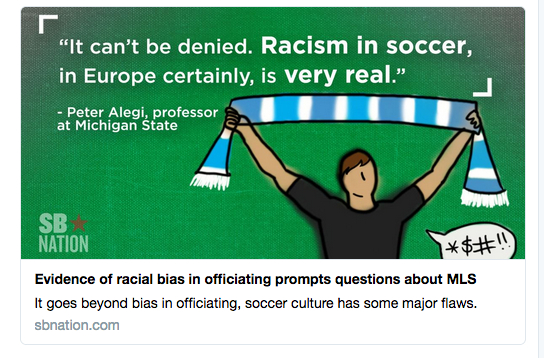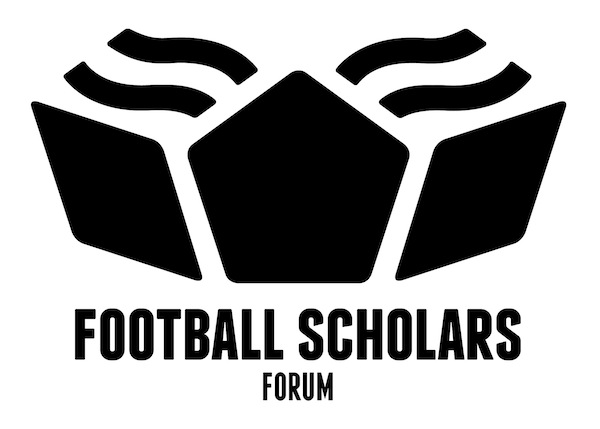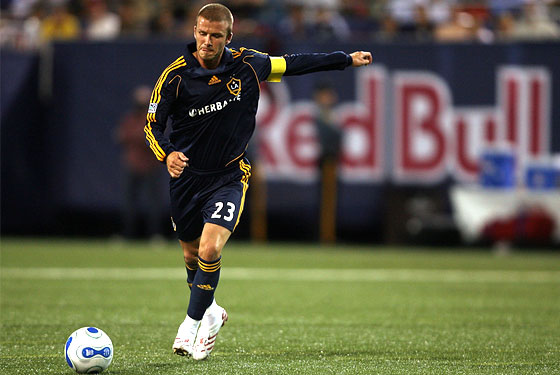
Is there an implicit racial bias in Major League Soccer and other U.S. leagues?
A piercing SB Nation story this week grappled with the implications of a recent study‘s disturbing findings “that black players are 14 percent more likely to be called for cautions than their non-black counterparts.” The study by Paste magazine also found that “black players are [. . .] more than twice as likely to receive red card ejections.”
In the article, I share my thoughts on this important issue with the SB Nation reporter, Tyler Tynes. I point out that “while finding empirical data is difficult, there’s plenty of soft and hard discrimination to believe that bias can take hold in refereeing. American soccer is not excused.” In fact, officiating bias can be understood as part of a broader pattern of racism in soccer, in the U.S. and internationally, one characterized by the practice of “stacking,” the presence of very few black coaches on the sidelines, and multiple forms of racist fan behavior.
“It can’t be denied,” I say in the piece. “Racism in soccer, in Europe certainly, is very real. And, regrettably, despite all the progress that’s been made in terms of messaging and tolerance in local football culture, it’s still there. And everybody knows it.”
But don’t take my word for it, click here to read the full story.
Tag: MLS
Part 2 of my interview with Boyzzz Khumalo (part 1 is here) opens with a description of the harrowing injury that prematurely ended his Major League Soccer career.
Boyzzz reflects on the inherent fragility of professional sports, the importance of higher education for life after soccer, and his extensive youth coaching experiences in both Soweto and in Michigan.
Boyzzz’s deeply personal commitment to community upliftment comes through in a detailed discussion of the challenges and hopes for the Umhlaba Vision Foundation. Anyone interested in getting involved or learning more about Umhlaba can send email to boyzzzkhumalo80 AT gmail.
Boyzzz Khumalo: From Soweto to Michigan
Thabiso “Boyzzz” Khumalo grew up in Soweto, South Africa, around the corner from the homes of two Nobel Peace laureates: Nelson Mandela and Archbishop Desmond Tutu. Like so many boys in the land of apartheid, he spent every moment of free time playing soccer and dreaming of becoming a professional player overseas. Unlike most of them, however, Boyzzz fulfilled his dream
On July 22, I sat down with Boyzzz for an interview on the campus of Michigan State University. We’d been hoping to do an interview ever since we met in November 2013 when he visited my “Sport in African History” seminar for a screening and discussion of Invictus.
This week was an especially opportune time to chat about Boyzzz’s sporting life because on Sunday, July 27, Lansing United, his current team, travels east to New Jersey to play a National Premier Soccer League semifinal against New York Red Bull Under-23.
How does a young man from Soweto end up playing in Michigan? In part 1 of our interview, Boyzzz shares memories of anarchic pickup games in Soweto; his first experience in the U.S. during a youth tournament that would change his life; and then scoring his first MLS goal for DC United.
Boyzzz also discusses the work of the Umhlaba Vision Foundation–a nonprofit organization he founded in 2007 with two South African friends. The goal of Umhlaba (meaning “world” in the Zulu language) is to change the lives of young Sowetans by creating a positive development environment through sport and education and bringing student-athletes to the United States. For more information about the foundation please email Boyzzz (boyzzzkhumalo80 AT gmail).
Don’t forget to come back tomorrow for part 2 of the interview!

Professional soccer in the U.S.A. took center stage at the Football Scholars Forum on Friday (Feb. 24). Ray Hudson not only braved the “football think-tank,” but also answered questions in the inimitable style he brings to broadcasting a Clásico on GolTV.
Using the documentary film Once in a Lifetime: The Extraordinary Story of the New York Cosmos, FSF discussed Cosmos and the NASL, as well as the representation and construction of history on film. “We had it all, man!” said Hudson looking back fondly to his playing days with the Ft. Lauderdale Strikers. The audio recording of the conversation is here.
FSF is holding its next online session on March 16, 2pm EST. Author David Goldblatt will be in East Lansing, Michigan, to discuss the second half of his book, The Ball is Round. FSF’s discussion of the first installment is here. For more information, contact Alex Galarza: galarza1[AT]msu[DOT]edu
David Beckham’s American misadventure

In two weeks time the ageing David Beckham has to return to the United States and play for the Los Angeles Galaxy in the MLS (against the New York Red Bulls at Giant Stadium outside New York City). In January this year, Beckham left the MLS mid-season to go play for AC Milan in Italy’s Serie A. Blasphemous to the MLS. Not surprisingly, Beckham has not been very enthusiastic about returning to the US. In 2007 Beckham had arrived, with much fanfare, at the Galaxy. His salary about 10 times that of the average MLS player. Sports Illustrated’s football writer, Grant Wahl, has been following Beckham for the last two years and his book on Beckham’s time at the Galaxy is coming out this month in the US (on July 14). As part of the hype, SL today published a lengthy excerpt from the book on its website. (It’s also in the latest issue of the magazine.) Among other things, Wahl writes about the cold war between Beckham and the Galaxy’s Landon Donovan (over who was the bigger star, as there is any comparison here), describes Beckham’s time at the Galaxy as “an epic disaster” and a “soccer fiasco,” that Beckham was a “cheapskate” (he did not pick up the tab after a night out with his much poorer teammates), reveals the process behind who appointed disastrous coach Ruud Gullit, and Beckham’s deficient captaincy skills. This should be fun.
Read here.